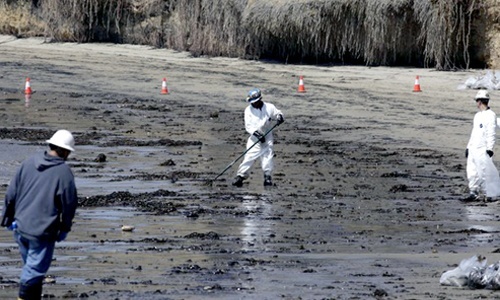
State of Emergency Declared: California Oil Spill Now Estimated at 105,000 Gallons




Greenpeace visited the site to survey the true damage, to share with the world the devastation to the Santa Barbara County coastline, and to communicate the dangers of fossil fuels so that we can transition to clean energy and prevent this from happening again.

Plains All American Pipeline, the company that owns the ruptured pipeline, has a history of spills. The company has apologized, with the district manager saying, “We’re sorry this accident has happened, and we’re sorry for the inconvenience to the community.”
This spill has not occurred in a vacuum. We can now add it to the sad history of oil-related spills and accidents that have happened the world over in the past years—including one that happened very near to this area in 1969, which spilled 3 million gallons of oil into the ocean.
As Annie Leonard, executive director of Greenpeace, has said, “Oil spills are never accidents. They are the direct result of substandard oversight of fossil fuel companies who put their profits above human and environmental impacts.” Each time a spill, oil train explosion or some other disaster occurs, we look to our leaders to take responsibility to make change. So far they’ve demonstrated that they don’t have the courage to stand up to Big Oil.
We all hope that this oil spill will quickly be contained and cleaned up. But are we willing to keep taking chances for future accidents to occur? I can’t help but think of the Bureau of Ocean Energy Management’s research that shows that there’s a 75 percent chance of an oil spill occurring in the Arctic if drilling takes place there. Even with that scary fact, the Obama administration has decided to give Shell the conditional go-ahead to drill. Let’s demand better from our President and other leaders before it’s too late.
YOU MIGHT ALSO LIKE
Pipeline Spews 21,000 Gallons of Oil Along California Coast

 233k
233k  41k
41k  Subscribe
Subscribe 